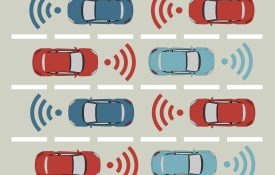-

Self-Driving Cars Face Psychological Speed Bumps
Industry and regulators seem ready to embrace autonomous cars, but consumers still need to be brought on board.
-
Don’t Suspend Students. Empathize.
The New York Times: To his teachers at Ridgeway High School in Memphis, Jason Okonofua was a handful. During class, his mind drifted and he would lose the thread of the lesson. He slouched at his desk and dozed off. Today Jason Okonofua is a newly minted psychology professor at Berkeley whose research focuses on empathy. As a Ph.D. student, he examined how helping couples understand each other’s feelings enabled them to talk to, not at, each another. Then he began applying the idea to education: How can you help teachers understand the ways adolescents make sense of the world? Tackling the problem from the teachers’ instead of the students’ perspective was a novel approach.
-
When the Mind Wanders
The Atlantic: In 2014, one in 16 Americans visited the ER for home injuries that resulted from, among other things, fumbling knives (the cause of at least 249,000 injuries), ladders (at least 105,000), and cookware (at least 22,000). One of the main causes of these accidents? A wandering mind, says Steve Casner, the author of Careful: A User’s Guide to Our Injury-Prone Minds. By one estimate, he notes, people daydream through nearly half their waking hours. Psychologists have recently focused more intently on the tendency to think about something other than the task at hand.
-
This is what happens when Americans are told about rising inequality
The Washington Post: The sharp growth in economic inequality — and its visibility as an issue in both the 2012 and 2016 American political campaigns — has led to an important debate about how to respond. Some in this debate suggest that economic inequality isn’t that important after all. Instead, they argue, it’s economic opportunity that Americans really care about. Americans just want good jobs and the prospect of upward mobility. It’s not so important to them that the gap between the wealthy and everyone else continues to grow. Indeed, some Democratic strategists believe that focusing on inequality could backfire. Our work suggests, however, that this view is mistaken.
-
Try These ‘Love Hacks’ to Fix Your Marriage
The New York Times: After studying thousands of couples, the psychologist Eli Finkel has an explanation for the decline in people’s satisfaction with their marriages over the past four decades: It’s a matter of emotional supply and demand. Many people are looking to their partners to replace the companionship and emotional support once provided by extended families and local institutions like churches, bowling leagues, bridge groups, fraternal lodges and garden clubs. Meanwhile, though, many couples are so busy with their jobs and parenting that they’re actually spending less time together by themselves. What to do?
-
Whites Have Huge Wealth Edge Over Blacks (but Don’t Know It)
The New York Times: The Yale researchers suspected that many people would not get the answers right. “I’m a person who studies inequality, who should really know how inequality looks,” said one of the psychologists, Michael Kraus, who researches the behaviors and beliefs that help perpetuate inequality. “And I look at the black-white gap, and I’m shocked at the magnitude.” Black families in America earn just $57.30 for every $100 in income earned by white families, according to the Census Bureau’s Current Population Survey. For every $100 in white family wealth, black families hold just $5.04. ...

